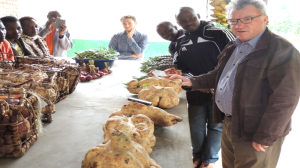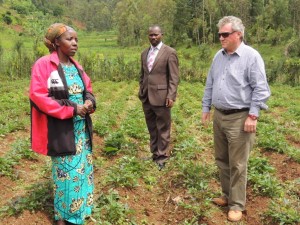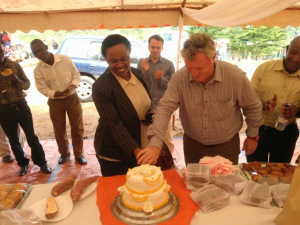On 30th of November 2015, CIP-Rwanda organized a trip for three guests from the Delegation of European Union to visit the International Potato Center’s (CIP) Scaling up Sweetpotato through Agriculture and Nutrition (SUSTAIN Rwanda) project funded by the United Kingdom government department responsible for administering overseas aid, UKAID, a member of the European Union.
The guests were His Excellency Michael Ryan, Ambassador and Head of Delegation of the European Union Rwanda, Arnaud De Vanssay 2nd Secretary –head of section Rural Development, and Morris an Intern at the delegation. This was a learning tour for the delegation to see how an agriculture sensitive nutrition for health project is implemented on the ground. The ambassador also wanted to meet farmers who have benefited from the project and learn about the impact the project is having on their nutrition status and economic welfare. Members of delegation wanted also to meet with the local authorities and understand how government agricultural programs are implemented on the ground.
The first stop for The EU delegation was the Roadside Market on Kigali-Musanze highway jointly developed by the Rulindo district

local government and SUSTAIN project. The sweetpotato selling point was initiated by CIP in partnership with Rulindo District in a bid to facilitate access to specific sweetpotato markets for farmers and for their sweetpotato roots and other vegetables produce. At the market, the EU Ambassador had an opportunity to chat with farmers who manage the facility.
He was pleased by the initiative of the SUSTAIN project that has three objective one being to commercialize sweetpotato roots produced by the small holder farmers. The market promotes other farm products produced by the farmers in an effort to provide a market as well as promote diversified foods. This initiative is also in line with SUSTAIN Rwanda’s project objective of contributing to fighting of malnutrition and stunting in Rwanda.

After a stopover at the market the delegation then visited the KOTEMU group farm. KOTEMU group is one of the first farmer groups to start working with Orange Flesh Sweetpotato (OFSP) under the SASHA project. Because the group had worked with OFSP for at least four years, they were in a position to give the visitors insights into the production of vines and roots for marketing and processing. Farmers were able to address all questions posed by the visitors. In his interaction with farmers, the ambassador was eager to know how profitable sweetpotato farming was compared to other crops. Margaret Muhayimana, a farmer representative, described her experience. She explained that before starting to work with SASHA project she had very few assets. In the last five years, she has been paying school fees for their four children from the proceeds she gets from sales of Orange Flesh Sweetpotato vines and roots. She has also been able to rebuild her house, get connected to the electricity grid, buy a dairy cow, and install a biogas unit for producing gas for her household use. She is able to pay health insurance and meet most of her household needs all because she is an Orange Flesh Sweetpotato farmer.

The EU Ambassador then visited the Rulindo District Mayor at his office. The Mayor explained to the EU delegation the contribution OFSP had made in the development of the local households. He was pleased with the partnership between CIP, the Ministry of Agriculture, the local government and the local development agencies to improve the nutrition status of the households as well as increase their incomes. He however observed that more needs to be done to improve the seed system so that vines can reach more households, improve storage facilities for sweetpotato and encourage more value addition. On his part the ambassador congratulated the Rulindo district for their excellent achievements during the appraisal of performance contracts where districts are judged countrywide and the top five districts are given an award.
The delegation also visited the Gakenke district where they saw more vine multiplication by other farmer groups. The climax of the field visit was a tour of a processing unit located at Gakenke run by a farmer cooperative. Members of the cooperative explained to the Ambassador the process of transforming fresh OFPS roots into value added products for sale. A display of various bakery products was showcased and tasted by members of the delegation. The team was impressed at the wide array of products that can be made using OFSP as an ingredient. At the end of the visit the Ambassador expressed his gratitude for an educative, enlightening and comprehensive field trip and was looking forward to other opportunities of seeing more work in the near future as CIP expands it program in Rwanda.